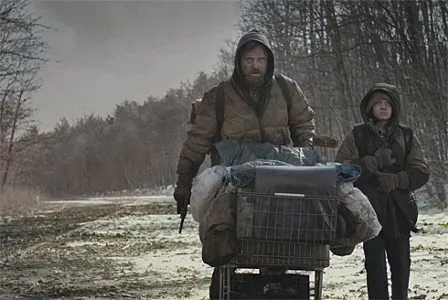A Dystopian 'Road' Story: "The Road"
- talhaaltinkaya
- Apr 23, 2023
- 4 min read
“Generations are getting worse as time goes on. There will come a time when generations will become so fond of worshiping power; brute force will come towards them and respect for the good will disappear. In the end, when no one is angry with wrongdoing anymore, or when no one is ashamed of the existence of evil, Zeus will destroy them too.”(Eric Fromm, The Origins of Human Destruction, Vol. I)

In The Road, which is an adaptation of Cormac McCarty's novel of the same name and is about the "post-apocalyptic" days the world is living in in the near future, the disasters that started as a result of earthquakes upset the balance of the world, changed the climates and the sun became invisible beyond the gray clouds covering the world. The extinction of plants brought the end of animals, and people began to die slowly and painfully day by day. In the midst of this dystopian atmosphere, a father and his son head south/coast in hopes of escaping this devastated world inhabited by cannibals.
The daylight has not reached for a long time, the concept of time has been lost beyond the year, the calendar and beyond, each passing day is darker than the previous day, the weather is getting colder day by day, no animal and plant species are left, the dried trees are destroyed, In the film, in which there are frequent earthquakes and a world that is almost completely destroyed, nothing is left in the name of nature and civilization. The roads, bridges, vehicles, stations and shopping centers that science and technology have given to humanity are only a part of the decor in this vanished gray world.

Human history has indeed progressed "from civilization to barbarism" and has, in a sense, completed its historical cycle. In the film, which is a hazy representation of what Hobbes describes as the 'state of nature', the film depicts the story of a father and son trying to survive in the world where the laws of the jungle are valid, as well as what kind of world they will live in if people destroy the eco-system.
In this world where cannibalism and "laws of the jungle" rule, humanity has lost its "humanity". Concepts such as 'society', 'thought', 'equality', 'togetherness' and 'rationality' that history and a whole historical development have brought to humanity have no place in this world anymore. For this reason, no one in the movie, including the main character and his child, has a name.

The thing that the film interrogates in this dystopian world, which Hobbes describes as "man's wolf to man" and which can be completely reduced to two different images like the strong and the weak, is the "man" himself. In addition, there is no Monarch in this world to whom people can transfer their rights and ensure the continuity of the order, as in the 17th century. People are living the 17th century in the 21st century.This situation brings with it the following question;
“How far can people go when the unity called society is destroyed?”
Is it inhumane to eat people or even to eat babies in order not to die of hunger?
The child character, positioned exactly in front of these wild questions, continues to maintain 'humanist' values such as helping people with pure and clean feelings and sharing their food with others. In a sense, the emphasis on the child, such as 'god' or 'angel' throughout the film, makes the child an indicator of a 'positive' future for humanity.
The concept that the film, in which purity and humanism is represented by the child character, insistently emphasizes and questions is 'human'.
Is a human being really a good and benevolent creature, who is conscious of being a community and lives by thinking about all other material beings in nature? Or is it a creature that can change depending on the conditions, just like in the natural life of animals, where the strong defeat the weak? The question of who he is becomes a sign of despair in the film.
To follow Fromm, human; On the one hand, it is a relative of many animal species in that it fights with its own kind, but on the other hand, man is the only species among thousands of fighting species that makes its fight reach destructiveness. In this sense, man is the only species that is a mass murderer, the only being in its own society with a boil.[1]

However, as Fromm states, human; It is not a creature that has internalized these feelings later on. Like all other living things in nature, human beings have feelings such as love and violence in their essence (if they have an essence), and these feelings are feelings that humans have acquired physically and spiritually throughout history.
Where did all this achievement lead humanity? The human being, who is shown occasionally in the movie, but is emphasized persistently at the end of the movie and does not have a thumb, is the best indicator of where we have come in terms of human history.
Beside all these indicators, the film deals with the origins of evil and dystopias by only focusing on the human being, and thus system criticism misses. Because, as seen in the movie, even if civilization is destroyed, even if the apocalypse turns the earth into an uninhabitable ruin, coca-cola is always there. The father opens the Coke, gives it to the child, and the child sips the Coke and says it is "very good".
So beautiful"!
[1] Erich Fromm, The Origins of Human Destructive Volume I






Comments